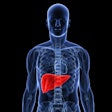Artificial intelligence (AI) software developer Qure.ai is directing attention to results from the clinical validation of its qXR AI algorithm for chest x-rays.
After training a deep-learning algorithm using 1.2 million chest x-rays and their corresponding radiology reports, researchers led by Preetham Putha of Qure.ai assessed its performance for identifying abnormal studies as well as nine specific abnormalities on an independent set of 2,000 chest x-rays. The qXR algorithm's performance was compared with the majority opinion of three radiologists after they completed an independent reading of the 2,000 studies.
Following receiver operating characteristic analysis, the researchers found that the algorithm yielded an area under the curve (AUC) of 0.93 for differentiating normal from abnormal chest x-rays, with AUC values ranging from 0.86 to 0.98 for identifying the individual abnormalities. They shared their results in an article published on arXiv.org.
"Apart from providing automated chest x-ray interpretations in underserved and remote locations, automated draft or preliminary reports of abnormal chest x-rays can improve turnaround and clear backlogs," the researchers wrote. "Further research is required to assess the clinical acceptance of artificial intelligence in the real-world and quantify the benefit of such automation to physicians and their patients."



















